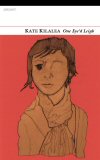South Africa-born Kilalea turns the world of slim first collections topsy-turvy; her London poems feel like travel poetry, repleat with its sense of new world trepidation, while those set abroad (Cape Town?) are comfortable - almost complacent - in their environment and gentle in their handling of incident. London is dramatically "Dickens' London,/an evening of frosted windows/and hot steaming steak ... London in your face ... wine on your breath" while Tsitsikamma National Park, even on fire, is a place "where, in the light of night/the trees swayed, akimbo ... A network of paths, torch-lit, came alive/as the nearby farmers arrived/armed with slopping buckets". To note that, however, is to momentarily forget that many of these poems are close-ups, focusing intently on objects and strangers, with little to tie them down to one place or another.
Kilalea seems to direct her eye, twitch her baton and unleash the music in every person or object as she examines each in turn.
There are two ways in which I think I can nail this review down. The first is to talk about Kilalea's voice. It is peculiar, in that there is a definite sense of trying to be as poetic as possible but an undercurrent of casualness that removes any subsequent strain. Take this opening stanza from 'Portrait of the beach':
New Year's Day. The sea smells of beer.
A helicopter is looking for sharks.
Two men are setting up a kosher hotdog stand
and it smells really terrible.
If it had gone on without that final line, it might have been too 'poet's all-judging eye' but Kilalea comes through in the nick of time. She does this a lot. I can equally imagine someone falling in love with this voice or finding it too clever and affected. Perhaps the litmus test in this regard is her bikini bottom, which she references twice, once for a metaphor and once, in the aforequoted poem, as a wave pulls it off. If that makes you warm to her, then you will probably like this book a lot.
The other thing to talk about is the orchestration. One of the most assured pieces in the book is 'The conductor and the world in the wallpaper', and like the titular character, Kilalea seems to direct her eye, twitch her baton and unleash the music in every person or object as she examines each in turn. Sometimes she will move over a whole scene in this way - the seaside could be her orchestra, or the shifting scenery of a near-death experience, or, in 'Test pieces', the accoutrements and sideline spectators of a long, lonely journey:
An old man boards the bus:
his skin flutters over potholes, his arms flap.
A flooded gutter carries the filthy, cloudy skies
like women balancing pots on their heads.
Last thing before bed, the downturned cup
suctioned to the washing-up rack lets go with a kissing-pop."
Set against pieces which are almost always divided into neat, equal stanzas, it puts me in the mind of, say, notes on a stave or a melody loping giddily over a taut rhythm section.
I will say this though: occasionally, Kilalea does miss her mark. I found 'The secret life of objects' (actually the first poem I read, outside of the context of the book) to be too familiar. The disturbance of inanimate things recorded as if it were signs of life - I can't think of any precise poem in which I've seen it done but it seems like an exercise. It also ends with the phrase 'their respective unfinishedness', which sticks in the throat.
Then there's the downside of playing the conductor: some objects feel selected purely for their metaphorical possibilities, and that leads one to be a little resistant to the notes of melancholy in the more personal poems - is the occasional pang of some uncertain emotion just another instrument in the pit?

Dr F sez: ".. ivy leaping like frogs over the house", "The rain looked on with big cow-eyes", "We're a four armed monster" - the book is full of things like this, as if willing me - nay, daring me - to imagine and then create such unnatural combinations of flora and fauna, weather and organ, human and human. Do I require such encouragement? I hope not, though I am still delighted to be provoked in this manner. This, however, troubles me:
We left London Fields on our bikes that day and the way we looked as we cycled away was the very complex mathematical equation for loving a thing and wanting to be rid of it contained within something human.
It's from The way we look is a game of chess. If there's one thing I despise, it's having devilish, wondrous things like chess and mathematics dangled in front of me only for it to turn out to be a front - a thin veneer - for some achey sentimentalism. Pah.










